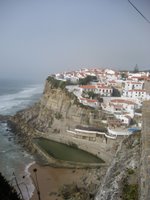Talking about Eden on earth the other day, Larry Crabb says in this book that we each have a choice to make: either we try to rebuild/recapture Eden in our lives, or make our pilgrimage towards Heaven. He contrasts Lamech and Enoch, both the 7th generation progeny of Cain and Abel. He says: Lamech declared: “I will build my city! I want my pleasures now.” Enoch said: “I will build God’s kingdom! And trust God to one day build a city for me to enjoy.” Because God cares deeply about his children, many times he chooses to relieve our suffering and solve our problems. But because his love is.. rooted in what he knows is best for us, he provides us with something more interesting to live for than ourselves. He catches us up in the supernatural reality of living for an eternal kingdom.
"As we explore our lives, we must never get so immersed in ourselves that we fail to remember that there is something far more wonderful to ponder. If I am to reject Lamech's approach and come to God as Enoch came, I must surrender my fascination with myself to a more worthy preoccupation with the character and purposes of God. I am not the point. He is. I exist for him. He does not exist for me.
The question we need to ask is this: Are we merely living, or are we walking with God? Are we merely committed to feeding our own souls, to arranging our lives around getting our needs met, to building our cities? Or are we committed to knowing God, to cooperate with him as loved participants in a plan larger than ourselves, to becoming like the Son whom the Father adores, and to waiting for the city that Christ is building right now?
The path to joy lies not in recovery from wounds, or setting boundaries, but in identifying and repenting of our commitment to advance our own well-being as we see fit. When that commitment takes priority over our determination to know God and make him known to others, then my friend is wrong. Our worst problem is sin, not pain.
We need to see ourselves as more sinful than wounded. We need to face the ugly, self centred energy present in all our conversations. As we become more aware of our self-centredness, our demand to feel better weakens under our developing humility. Awarenss of our self centredness puts us in touch with our longing for a clean heart and a giving spirit. Awareness of God's forgiveness makes us gratefully amazed that we are accepted by someone who sees us at our worst. "
 By the time Mongolia took on the Reich colours, we were all rolling on the floor in stitches...
By the time Mongolia took on the Reich colours, we were all rolling on the floor in stitches...











